IELTS Writing AI: Effective Essay Assessment & Learning
IELTS Writing AI is an advanced tool that evaluates essays based on official IELTS criteria, providing instant scoring, personalized feedback, and actionable improvement tips. In this guide, we’ll explore what IELTS Writing AI is, its benefits, who should use it, pros and cons, top tools, and how to practice effectively with IELTS Test Pro.
I. What is IELTS Writing AI?
IELTS Writing AI represents sophisticated machine learning technology that evaluates essays using official IELTS assessment criteria. These systems analyze Task Achievement, Coherence and Cohesion, Lexical Resource, and Grammatical Range and Accuracy with remarkable precision.
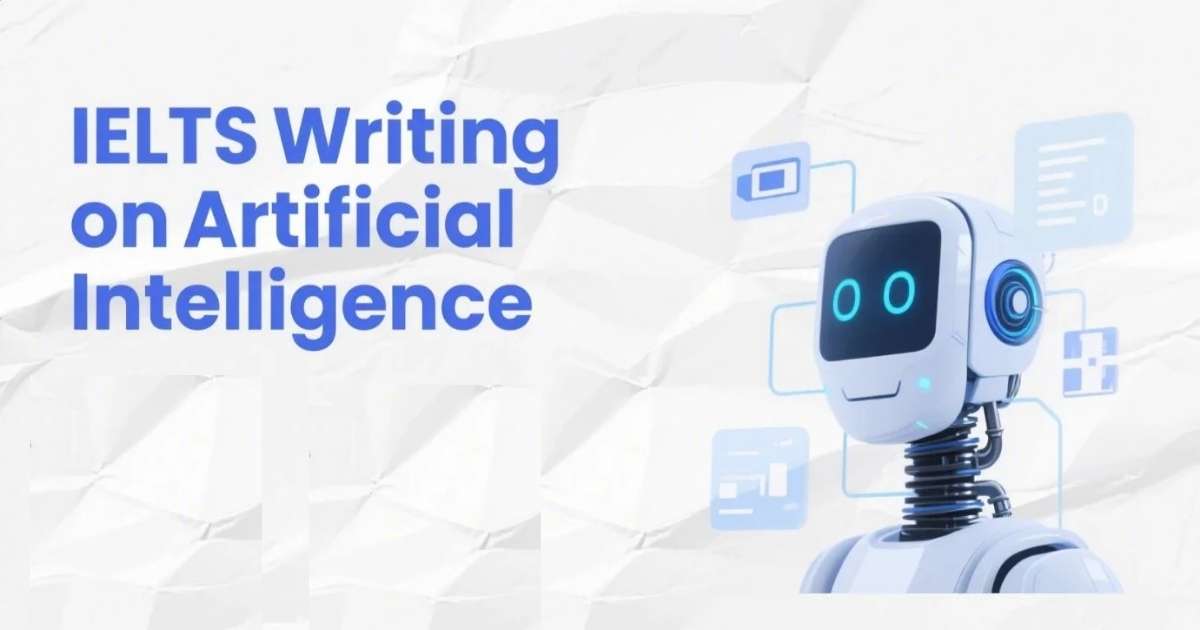
Advanced algorithms examine linguistic patterns, vocabulary sophistication, grammatical structures, and essay organization. The technology processes thousands of data points within seconds, comparing student responses against extensive databases of band-scored essays.
- IELTS writing task 1 systems evaluate data interpretation accuracy, trend identification, and appropriate language use for academic reports.
- IELTS writing task 2 platforms assess argument development, position clarity, and critical thinking demonstration.
Leading platforms integrate natural language processing with Cambridge English assessment standards. These IELTS writing test checker systems provide detailed feedback matching human examiner evaluations while eliminating inconsistency and bias.
II. The Benefits of IELTS Writing AI
Modern AI writing assessment technology delivers transformative benefits that revolutionize traditional IELTS preparation methods, offering unprecedented advantages across educational, practical, and performance dimensions.
- Educational advantages center on instant feedback mechanisms that transform learning efficiency through real-time error identification and immediate band score prediction. Personalized learning paths emerge through weakness pattern recognition and targeted practice recommendations, while progress tracking dashboards help learners monitor improvement trajectories and focus on specific skill gaps effectively.
- Practical benefits encompass cost efficiency that delivers 80% cost reduction compared to private tutoring while providing unlimited practice sessions without scheduling constraints. This accessibility democratizes quality IELTS preparation globally, ensuring 24/7 availability across multiple device platforms with offline practice capabilities.
- Performance enhancement produces faster skill development with average 0.5-1.0 band improvements within 6 weeks through focused error correction and consistent practice motivation. Systematic feedback accelerates learning curves substantially, enabling students to identify and address weaknesses more efficiently than traditional assessment methods.
III. Who Should Self-Study IELTS with IELTS Writing AI?
- Independent home learners benefit tremendously from AI-powered assessment systems. These platforms suit students requiring intensive practice sessions and those seeking deep understanding of scoring criteria.
- Candidates with existing foundations who want band score improvements find AI particularly valuable. Budget-conscious learners access quality feedback without expensive tutoring costs.
- Time-constrained students appreciate flexible scheduling options. Teachers seeking assessment support can leverage AI tools for classroom enhancement and student progress monitoring.
- Working professionals preparing for IELTS while managing career responsibilities discover AI solutions to accommodate their busy schedules effectively.
IV. Pros & Cons of IELTS Writing AI
Understanding the advantages and limitations of AI-powered assessment versus traditional human evaluation helps students make informed decisions about their IELTS preparation strategy.
1. Pros of IELTS Writing AI
| Pros | AI Assessment Advantages |
| Consistency | 100% reliable criteria application without mood variations |
| Speed | Instant results delivery within seconds |
| Bias | Completely objective evaluation eliminating human prejudice |
| Availability | 24/7 worldwide access without scheduling limitations |
| Personalization | Data-driven individual insights based on performance patterns |
| Cost | Depend on what IELTS Writing AI you choose |
2. Cons of IELTS Writing AI
- Limited Cultural Context Understanding: AI systems may struggle with culturally specific references, idiomatic expressions, or nuanced arguments that human examiners would recognize and appreciate.
- Lack of Creative Assessment: While AI excels at identifying technical errors, it may not fully appreciate creative writing approaches, unique perspectives, or innovative argumentation styles that demonstrate higher-order thinking skills.
- Technology Dependency: Students risk becoming overly reliant on AI feedback, potentially limiting their ability to self-assess and develop independent critical thinking skills essential for real examination success.
- Standardized Response Patterns: AI systems may inadvertently encourage formulaic writing approaches that achieve high scores in automated assessment but lack the authenticity and personal voice valued in human evaluation.
- Internet Connectivity Requirements: Most AI platforms require stable internet connections, limiting accessibility in areas with poor connectivity or for students without reliable technological resources.
V. Common IELTS Writing AI Tools
The market offers diverse AI-powered writing assessment platforms, each with unique strengths and specialized features designed to address different aspects of IELTS Writing preparation and skill development.
- ChatGPT: A flexible AI that helps with brainstorming, structuring essays, and suggesting alternative expressions for Task 1 and Task 2.
- Google Gemini: Provides deep contextual essay evaluation, analyzing coherence, argument flow, and advanced vocabulary use.
- Grammarly: A grammar and style checker offering IELTS-specific features such as band score predictions and task-based feedback.
- QuillBot: Focuses on paraphrasing and sentence restructuring to improve variety, vocabulary, and clarity.

Unlike general AI tools, IELTS Test Pro is built exclusively for IELTS preparation. It replicates real exam conditions and delivers a detailed band score breakdown across all four official assessment criteria
- Task Achievement
- Coherence & Cohesion
- Lexical Resource
- Grammatical Range & Accuracy
What sets IELTS Test Pro apart is its ability to provide personalized feedback, examiner-style insights, and high-scoring sample responses. Students can track their progress, identify weaknesses, and receive targeted recommendations that directly align with IELTS standards.
With IELTS Test Pro, you don’t just correct grammar – you learn how to write like a top IELTS candidate. The platform bridges the gap between practice and performance, helping students move from band 6.0 essays to band 7.5+ with clear, actionable guidance.
VI. How to Self-Study IELTS Writing AI on IELTS Test Pro
Master IELTS Writing through systematic AI-powered practice using these streamlined steps designed for maximum learning efficiency and rapid skill development.
Step 1: Access and Select Practice Topics
Navigate to IELTS Test Pro Practice Writing and browse the comprehensive question library. Choose appropriate Task 1 or Task 2 prompts matching your current level, then click “Start now” to begin timed practice sessions with authentic exam conditions.
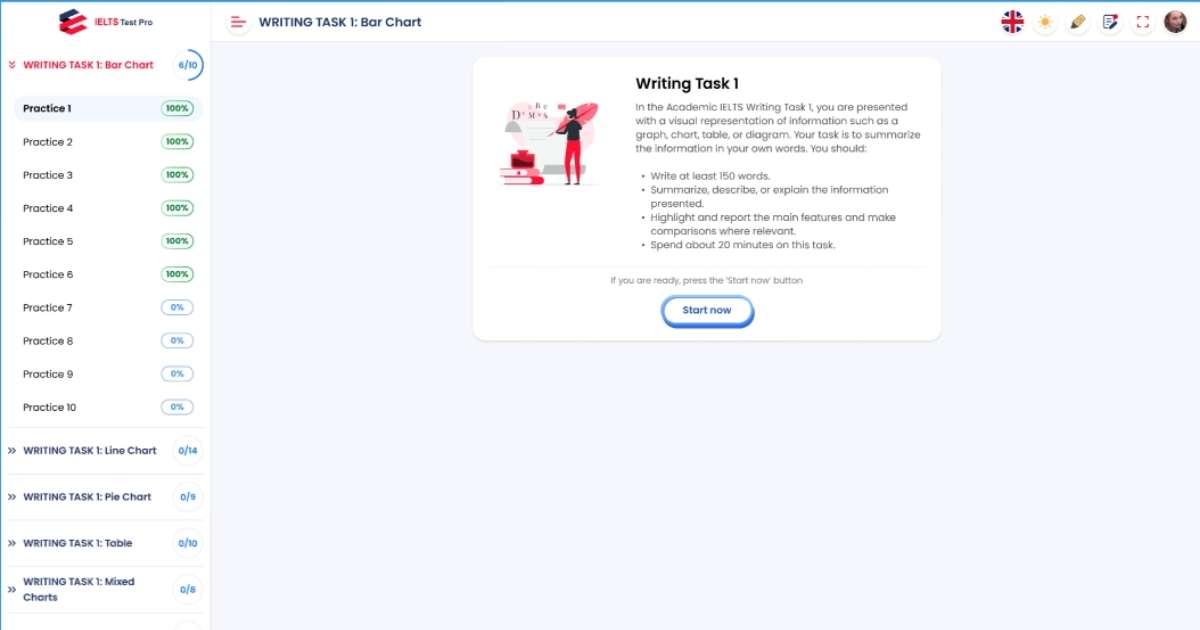
Step 2: Submit Your Essay and Receive Comprehensive AI Scoring Report
Complete your essay within the allocated timeframe, monitoring word count and timing indicators. Submit your response for instant AI evaluation based on official British Council criteria. Access your results through the “Writing Assessment” tab to view overall band scores and individual criterion breakdowns.
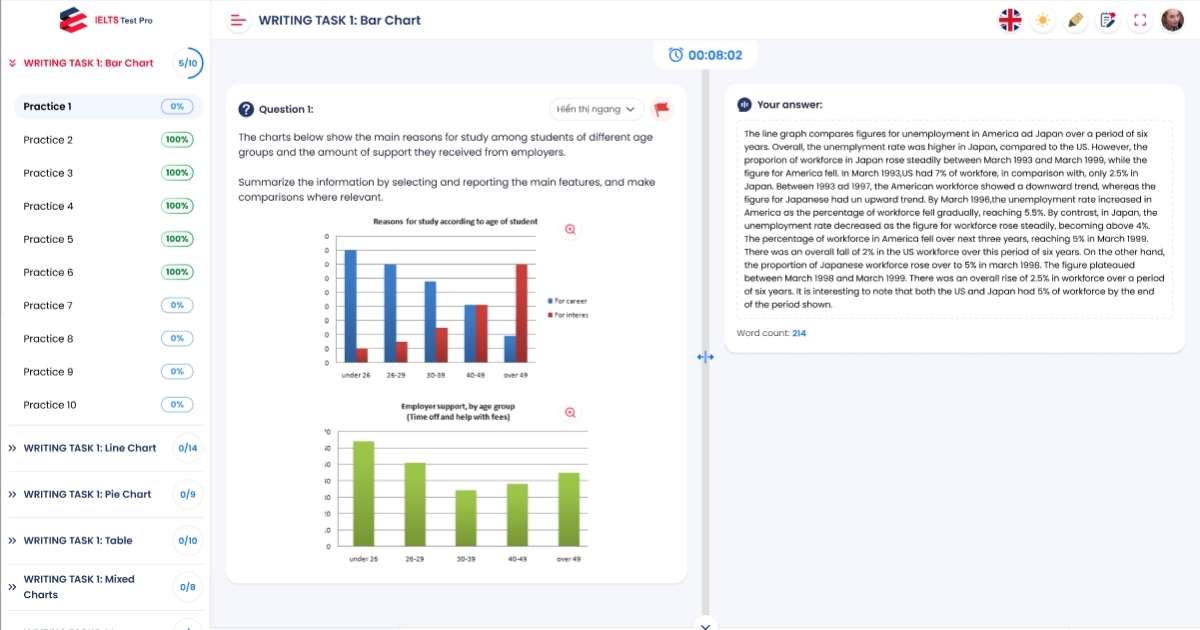
Step 3: Analyze Detailed AI Assessment Feedback
Navigate to “Criteria Score Report” for in-depth analysis covering Task Achievement, Coherence & Cohesion, Lexical Resource, and Grammatical Range & Accuracy. Review specific error identification and improvement suggestions through the “Grammar Correction” tab, comparing your work against expert sample responses provided below each question.
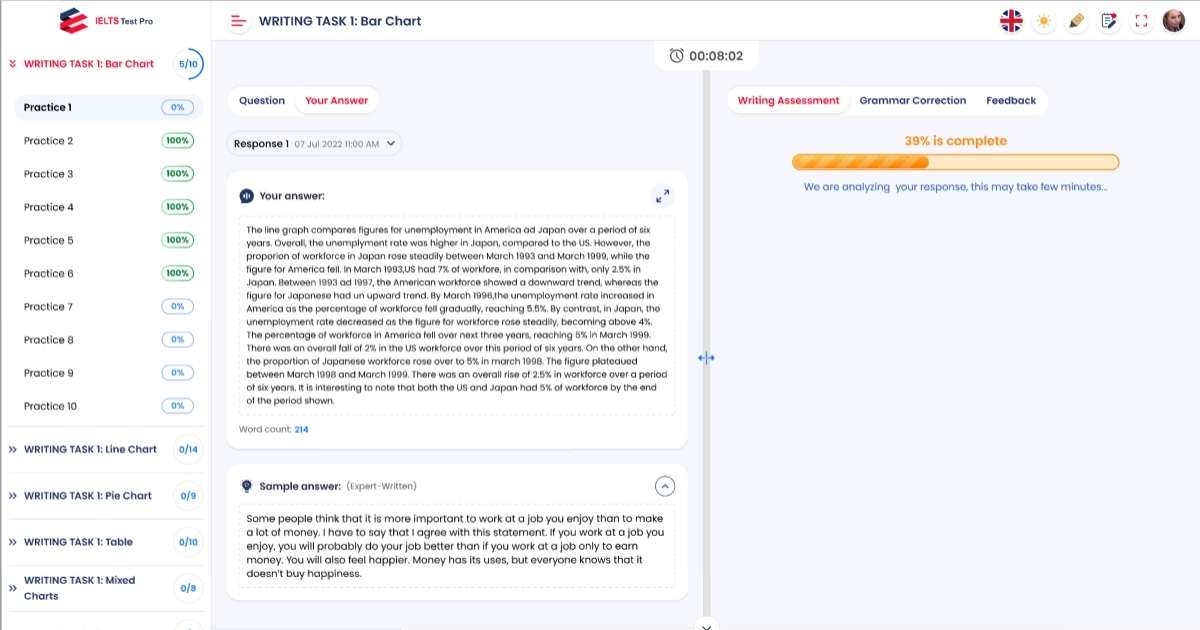
Step 4: Note Errors and Rewrite Your Essay
Document recurring mistakes and implement AI-suggested improvements in your revision. Focus on applying advanced vocabulary, enhanced grammatical structures, and better content organization based on the detailed feedback received. This targeted rewriting process accelerates skill development significantly.
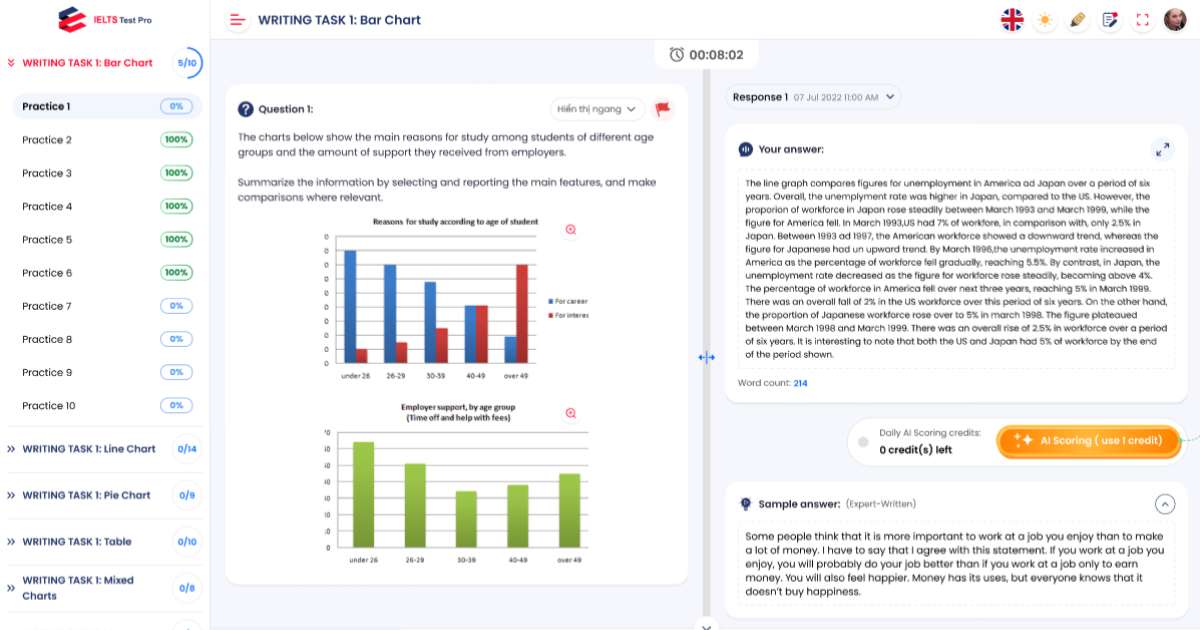
Step 5: Repeat the Process and Track Your Progress
Continue regular practice cycles while monitoring improvement trends through the platform’s tracking system. Provide feedback through the “Feedback” button to help enhance the platform’s effectiveness. Consistent practice with AI assessment creates sustainable improvement patterns leading to target band achievement.
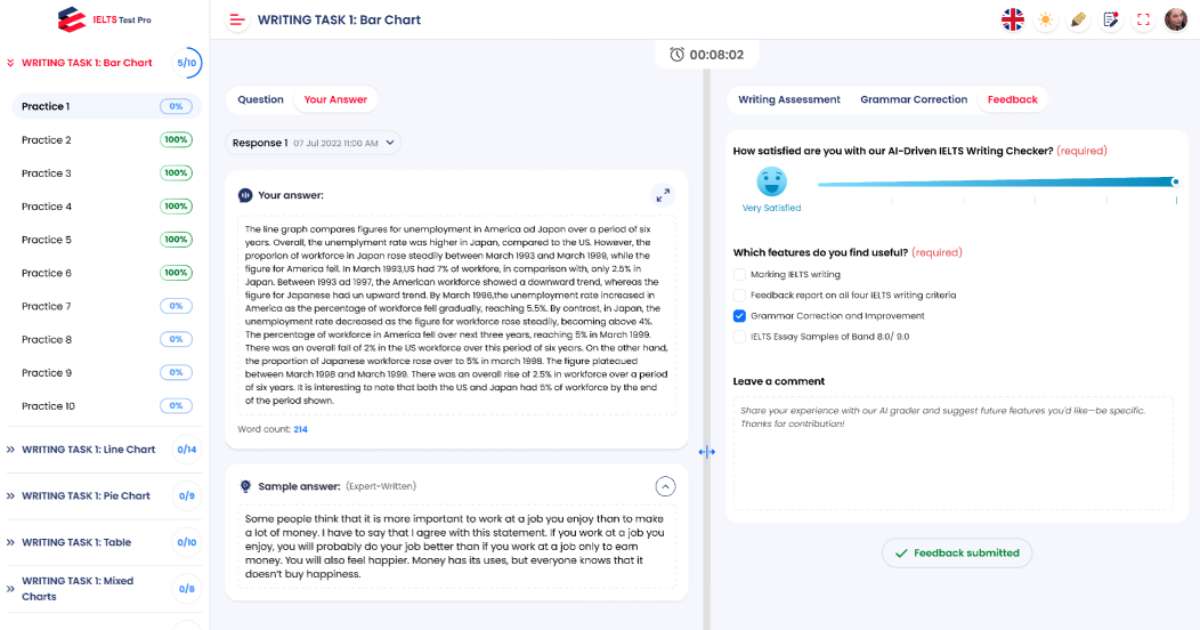
This IELTS Writing AI writing practice approach, combined with AI assessment technology, provides an efficient pathway to IELTS Writing success. The Writing checker systems available today offer unprecedented access to quality feedback previously available only through expensive tutoring arrangements.
Ready to transform your IELTS Writing preparation? Experience the power of AI-driven assessment and accelerate your journey to target band scores with cutting-edge technology that never sleeps.